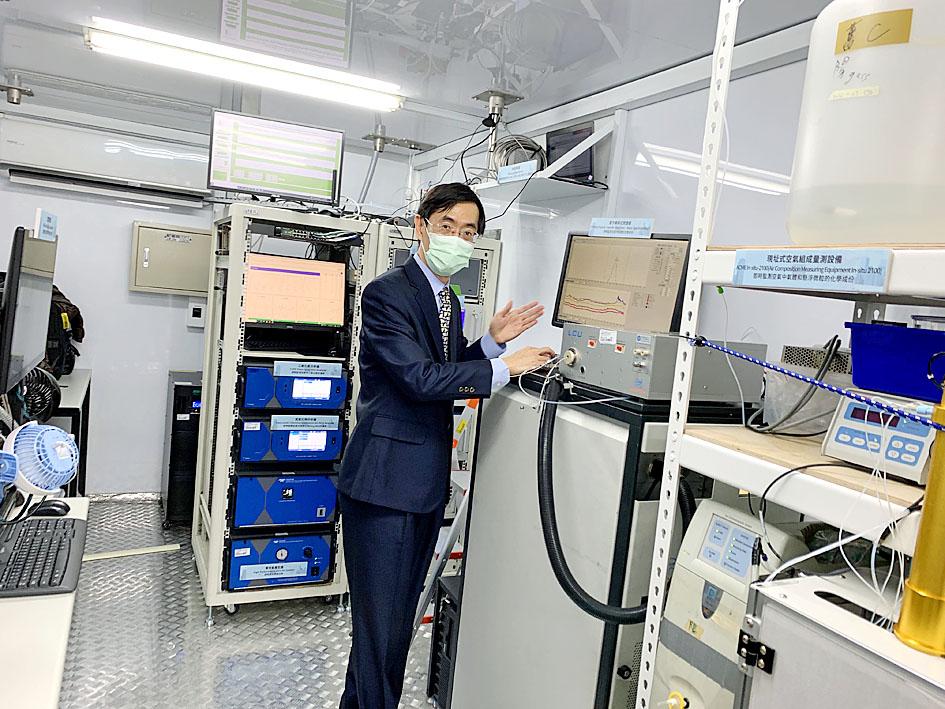An air quality monitoring station has been set up in Taichung to determine the composition of air pollutants in the city, researchers said on Sunday.
The Surface Air Pollution Research Station, which was established by Academia Sinica’s Research Center for Environmental Changes and the Taichung City Environmental Protection Bureau at a cost of NT$100 million (US$3.62 million), would collect and analyze air samples over the next four years, said Charles Chou (周崇光), CEO of the center’s Air Quality Research Center.
In a project led by Academia Sinica researchers, the station would take precise measurements of more than 100 types of fine particulates smaller than 2.5 micrometers (PM2.5) and ozone precursors, which would help the city devise policies to combat sources of air pollution, he said.

Photo: Tsai Shu-yuan, Taipei Times
Average concentrations of PM2.5 in the city have decreased annually over the past several years, but people have grown more aware of the dangers of air pollution, the effects of which are more obvious during the fall and winter months, he said, adding that air pollution still affects visibility in central and southern Taiwan during the winter.
“The complex physical and chemical properties of air pollution mean it is necessary to perform precise analysis on samples to come up with effective policies to combat it,” he said.
Taichung’s geographical location, which faces winds from the land and sea, the urban heat island effect, and valley and monsoon winds, adds to the complexity of understanding air pollution in the city, he said.
The station, which is the first of its kind in Taiwan, was set up on the roof of Taichung’s Second Municipal Government Building.
The project would involve research into the physical and chemical processes of air pollution in central Taiwan, including sources of emission, and how pollutants are transmitted and transformed, center director Chen Yue-gau (陳于高) said.
Researchers would use satellite and surface telemetry technology, optical radars, Internet of Things devices and artificial intelligence, he said.
The team would also use flue samples to analyze the composition of volatile organic compounds, he said.
The annual average concentration of PM2.5 in Taichung dropped to 15.4 micrograms per cubic meter in 2020, which is near the national standard of 15 micrograms per cubic meter, Taichung Environmental Protection Bureau Director Chen Hung-yi (陳宏益) said.
“However, the closer we get to that standard, the more difficult it becomes to further lower the PM2.5 level. Last year the level even rose in some parts of the country,” he said.
Ozone pollution is also a growing problem for several counties and municipalities nationwide, he said.

Trips for more than 100,000 international and domestic air travelers could be disrupted as China launches a military exercise around Taiwan today, Taiwan’s Civil Aviation Administration (CAA) said yesterday. The exercise could affect nearly 900 flights scheduled to enter the Taipei Flight Information Region (FIR) during the exercise window, it added. A notice issued by the Chinese Civil Aviation Administration showed there would be seven temporary zones around the Taiwan Strait which would be used for live-fire exercises, lasting from 8am to 6pm today. All aircraft are prohibited from entering during exercise, it says. Taipei FIR has 14 international air routes and

Taiwan lacks effective and cost-efficient armaments to intercept rockets, making the planned “T-Dome” interception system necessary, two experts said on Tuesday. The concerns were raised after China’s military fired two waves of rockets during live-fire drills around Taiwan on Tuesday, part of two-day exercises code-named “Justice Mission 2025.” The first wave involved 17 rockets launched at 9am from Pingtan in China’s Fujian Province, according to Lieutenant General Hsieh Jih-sheng (謝日升) of the Office of the Deputy Chief of the General Staff for Intelligence at the Ministry of National Defense. Those rockets landed 70 nautical miles (129.6km) northeast of Keelung without flying over Taiwan,

City buses in Taipei and New Taipei City, as well as the Taipei MRT, would on Saturday begin accepting QR code payments from five electronic payment providers, the Taipei Department of Transportation said yesterday. The new option would allow passengers to use the “transportation QR code” feature from EasyWallet, iPass Money, iCash Pay, Jkopay or PXPay Plus. Passengers should open their preferred electronic payment app, select the “transportation code” — not the regular payment code — unlock it, and scan the code at ticket readers or gates, General Planning Division Director-General Liu Kuo-chu (劉國著) said. People should move through the

The Ministry of National Defense (MND) today released images of the military tracking China’s People's Liberation Army (PLA) movements during the latest round of Chinese drills around Taiwan. The PLA began "Justice Mission 2025" drills today, carrying out live-fire drills, simulated strikes on land and maritime targets, and exercises to blockade the nation's main ports. The exercises are to continue tomorrow, with the PLA announcing sea and air space restrictions for five zones around Taiwan for 10 hours starting from 8:30am. The ministry today released images showing a Chinese J-16 fighter jet tracked by a F-16V Block 20 jet and the